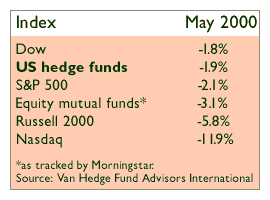|
Hedge funds outperform
|
 |
June 26, 2000: 8:01 a.m. ET
Riskier investments post higher returns than mutual funds for May
By Staff Writer Jennifer Karchmer
|
NEW YORK (CNNfn) - Hedge funds, which use riskier investing strategies than typical mutual funds, outperformed most major benchmarks in May amid the volatility that has rocked the markets since earlier this year.
Hedge funds were down 1.9 percent in May, according to Van Hedge Fund Advisors International, which tracks about 450 hedge funds. And since the beginning of the year, hedge funds have posted a 5.4 percent return while average equity mutual funds are down 2.6 percent, according to Morningstar.
Meredith Jones, vice president and director of research at Van Hedge in Nashville, Tenn., says because hedge funds have a variety of investment strategies at their disposal, they can maneuver around the markets during extreme volatility. For instance, short sellers, which take advantage of dropping stock prices, have done well in this environment with a return of 10.4 percent in May.
 In May, many of the major market benchmarks were in negative territory. For example, the tech-heavy Nasdaq, which took a nosedive in April, was down 11.9 percent. Also in May, the S&P 500 was down 2.1 percent and the Russell 2000, which tracks small-cap stocks, lost 5.8 percent. In May, many of the major market benchmarks were in negative territory. For example, the tech-heavy Nasdaq, which took a nosedive in April, was down 11.9 percent. Also in May, the S&P 500 was down 2.1 percent and the Russell 2000, which tracks small-cap stocks, lost 5.8 percent.
"When you have indexes that are dropping like that, you have a lot of opportunities for short sellers to get in and short," she said. "It's a target-rich environment for short sellers, and this is their time to shine."
Using up and down markets
Unlike mutual funds, hedge funds, which are unregulated pools of money, use riskier strategies such as leverage and shorting to take advantage of falling markets.
"For most hedge funds, everything - up and down markets -- should be an opportunity rather than a detriment," said Michael Ocrant, editor of the Mar/Hedge newsletter in New York.
Click here to learn about the different types of hedge fund strategies
"They have the ability to get out of the way of market downturns, the latitude to use options and can do a better job against market volatility," Van Hedge's Jones added.
Who can get in? And why?
Minimum investment requirements for hedge funds can run as high as $1 million, preventing most individual investors from getting in. Typical hedge fund investors are corporations, endowments, foundations and wealthy individual investors who have a high net worth of at least $1 million and an annual salary of $200,000.
Many of those investors buy hedge funds to round out their portfolios especially during extreme market volatility, Jones said.
"There are people who want portfolio protection for just these kinds of incidences," she said. "People who believe that it is a viable part of portfolio construction and diversification."
Check your mutual funds, and read the latest fund news on CNNfn.com.
Checking the crystal ball
So how will hedge funds perform in coming months? Some say it's too soon to tell, but Jones says investors continue to buy hedge funds to diversify their portfolio in both up and down markets.
"There is strong historical evidence that during continuing market volatility, investing in hedge funds makes a great case," she said. 
-- Staff Writer Jennifer Karchmer covers hedge funds for CNNfn.com. Click here to send her e-mail.
|
|
|
Soros: 'I've lost my touch' - June 16, 2000
Soros' new fund to cut back on "macro" plays - June 15, 2000
Hedge funds for beginners - June 5, 2000
Another Soros goodbye - June 2, 2000
Hedge funds reveal more - May 26, 2000
A hedge fund style falters - May 11, 2000
Soros facing an exodus - May 4, 2000
Some hedge funds prevail - May 4, 2000
A shakeup at Soros - April 28, 2000
Tiger Management closes - March 30, 2000
Some hedge fund basics - Oct. 2, 1998
|
|
|
|
|
|
 |

|

